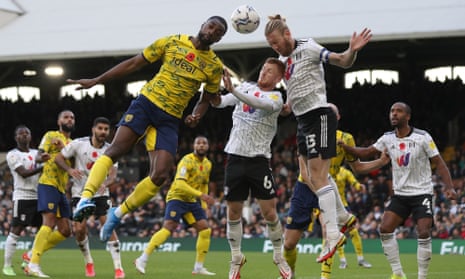Secret talks between the Premier League and the EFL have been held to discuss removing the controversial parachute payments system, with alternatives set to be put to top-flight clubs for consideration.
Discussions have been ongoing throughout the Covid period about how better to organise financial redistribution. Whereas the EFL has targeted parachute payments as a major problem, the Premier League had remained defiant in support of the current system – citing the £1.5bn it transfers down the leagues over a three-year period.
That position has changed, with a number of alternative proposals developed and debated among executives. The pressure is to make those changes a reality.
Parachute payments are given to clubs relegated from the Premier League to cushion the blow of revenue lost from leaving the top flight. The EFL argues this creates competitive distortion, with other clubs spending money they do not have to keep up.
One of the recommendations in the Crouch review, published last week, stated that the Premier League and EFL should come up with a solution to the parachute payments problem by the end of the year, with outside voices then brought in to advise on change if no solution can be agreed.
Although the discussions are understood to be advanced, ideas have not been presented to Premier League clubs or the EFL board. On Monday the Premier League board agreed to hold an emergency shareholders’ meeting this week to discuss the Crouch review.
Under the terms of the domestic TV deal approved by government this year, parachute payments are to remain in place for another three years. On Friday Richard Masters, the Premier League’s chief executive, suggested a softening of his tone on parachute payments. “If there is a way of uniting the clubs in our league and the clubs in the Championship with a new proposal,” he told the BBC, “we should drive for that and we’re happy to work at pace on that project.”
New ideas are likely to be divisive among Premier League shareholders, with parachute payments forming a safety net for clubs committed to big spending in the top flight.
Several Premier League executives have spoken out about the Crouch review, with the vice-chairman of West Ham, Karren Brady, vocally defending the parachute payment system. Arguing that clubs would go bankrupt without the money, she wrote in the Sun that Tracey Crouch had “fallen into a do-gooder trap” by proposing reform. “Maybe Tracey and [EFL chair Rick] Parry confuse competition with fairness,” she wrote.
Quick GuideHow do I sign up for sport breaking news alerts?
Show
- Download the Guardian app from the iOS App Store on iPhone or the Google Play store on Android by searching for 'The Guardian'.
- If you already have the Guardian app, make sure you’re on the most recent version.
- In the Guardian app, tap the Menu button at the bottom right, then go to Settings (the gear icon), then Notifications.
- Turn on sport notifications.
Brady has been joined by Aston Villa’s CEO, Christian Purslow, and Crystal Palace’s chairman, Steve Parish, in speaking out against the Crouch review, part of an upwardly mobile group of clubs who hold an increasing sway in the league since the failed European Super League plot among the ‘big six’ clubs.
On Monday Parish warned against the implementation of an independent regulator for football, the key recommendation of the Crouch review. Debating the point with Gary Neville on Twitter, Parish said: “Regulators are there so that governments can control markets or companies within a framework they set and can alter. Regulators are instruments of government and they are independant [sic] only up to enforcing the current remit which can be changed at any time by a new act of parliament. So Football will be – under this plan controlled by government.”
